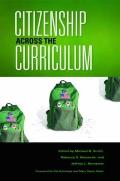Citizenship across the Curriculum. Michael B. Smith, Rebecca S. Nowacek, and Jeffrey L. Bernstein, eds. Bloomington: Indiana University Press, 2010
Debates about the primary purpose of higher education often involve the relative importance of content mastery, abstract reasoning skills, and personal development in areas such as civic engagement. However, contributors to Citizenship across the Curriculum argue that faculty members can promote crucial “citizenship” behaviors and attitudes among students without sacrificing traditional learning outcomes.
The first nine chapters consist of a series of case studies written by former participants in a residency program at the Carnegie Foundation for the Advancement of Teaching. Each author discusses key citizenship skills and describes his or her own pedagogical practices designed to promote this form of citizenship. One of the book’s strengths is the diverse disciplines of these courses, including social sciences (chapters 1–3), humanities (chapter 4), mathematics and natural sciences (chapters 6 and 7), science education (chapter 8), and multidisciplinary courses (chapters 5 and 9). All authors provide at least some evidence for the efficacy of their curricular designs in promoting the desired outcomes. Particularly in the chapters related to science, the authors demonstrate that content mastery does not seem to be adversely affected by incorporating social issues. The last two chapters summarize and synthesize the preceding ones and discuss future directions.
An important finding across the chapters (and one that should receive closer examination) is that students seemed much more interested in course material when civic concerns were incorporated into the curriculum. This discussion was most intriguing in the chapters about biochemistry, math, and science education courses, which described students’ eagerness to apply their scientific and technical knowledge to broader issues. The chapters convincingly illustrate that this application of knowledge and skills was quite novel for these students and constituted a critical skill in and of itself.
Each of the nine case-study chapters ends with brief commentaries from two of the other contributors, followed by a response from the chapter’s author. In theory, this approach could create an interesting dialogue. However, perhaps since the contributors all participated in the same residency experience at the same time, the commentaries largely congratulate the authors and sometimes “raise questions” that the pedagogies are specifically designed to address. The harshest critique occurs on a couple of occasions when a fellow contributor is initially skeptical but comes to appreciate the pedagogical approach advocated in the chapter.
The authors generally frame their argument in the context of prevailing trends in U.S. society and on college campuses, such as political disengagement, the reliance on emotion (as opposed to facts and reason) in political discourse, parental overinvolvement in college students’ lives, and students’ tendency to rely on rote memorization in their course work. The pedagogical approaches described throughout the book are advocated as means to combat these challenges. The real-world curricular examples are arguably the most useful part of the book, as they contain important insights for instructors who value civic education and wish to incorporate effective practices in their own classrooms. The chapters provide not only specific activities and assignments but also a discussion of key issues and concepts that can help instructors design their own interventions.
Although a book should not be judged by its cover, it seems reasonable to expect that a cover would accurately reflect the topics and perspectives in the book. In this case, multiple contributors argue that the term citizenship inappropriately connotes being a documented citizen of a country (chapters 2 and 3), and others specifically argue that the word should not be defined in terms of nationality (chapters 4 and 8). Therefore, the use of citizenship in the title—even though the authors subsequently attempt to broaden, reframe, and redefine this term to suit their purposes—seems peculiar. In addition, the cover shows a backpack with several buttons attached. One of these says “VOTE” (with stars and stripes surrounding this word), and two others contain the logos of the Democratic and Republican parties. The backpack also features an iron on patch of the U.S. flag. The only symbol that connotes anything other than a U.S.-centric, politically based, legal-citizen perspective is a single button with a world map. This overall visual depiction belies the unanimous agreement of the contributors and editors that “citizenship” extends well beyond U.S. political behavior.
The dichotomy between cover and content is also evident in the intended readership. The quotations and description on the back cover state that this book is useful for instructors who seek to incorporate civic learning into their courses. (I wholeheartedly agree with this suggestion.) However, in its synthesis of the preceding chapters, chapter 10 argues that the authors “are not fundamentally focused on the craft of designing courses or crafting curricula.” Although that statement is valid to some extent, it seems to downplay the importance of the (stated) primary audience. Moreover, the introduction argues that citizenship should be incorporated across the curriculum in a similar manner as the “writing across the curriculum” movement. The possibility of considering and working toward this ambitious institutional goal is quite intriguing. While this book provides some interesting examples of how faculty members might foster civic learning in their own courses, the more complicated question of how a college or university might adopt these practices for the institution is not addressed in the other chapters.
Nonetheless, Citizenship across the Curriculum provides useful ideas about incorporating civic engagement in a diverse set of college courses. One hopes this book will help make the case that educators can improve student learning through—not despite—a curricular focus on civic issues and concerns.
Nicholas A. Bowman is a postdoctoral research associate in the Center for Social Concerns at the University of Notre Dame. He co-edited Critical Issues in Higher Education for the Public Good: Qualitative, Quantitative, and Historical Research Perspectives.




